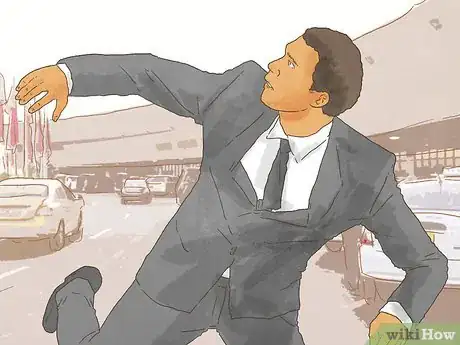This article was co-authored by wikiHow Staff. Our trained team of editors and researchers validate articles for accuracy and comprehensiveness. wikiHow's Content Management Team carefully monitors the work from our editorial staff to ensure that each article is backed by trusted research and meets our high quality standards.
There are 15 references cited in this article, which can be found at the bottom of the page.
This article has been viewed 67,528 times.
Learn more...
It’s unlikely that you or anyone you know will be a victim of a terrorist attack. However, if you are traveling to a conflict zone, doing some research beforehand can help you avoid being a victim of terrorism. Other strategies can help you both abroad and in your own country. For example, avoid public events and areas that are popular with tourists, and exercise extra caution during religious holidays. Always keep your phone handy and identify nearby safe havens like hospitals, hotels, and police stations. Remember, the likelihood of being a victim of a terror attack is vanishingly small.
Steps
Ensuring Personal Safety
-
1Check the terror warnings before traveling. Your national government’s department of state should provide a list of locations that are dangerous for traveling due to a high risk of terror incidents. Consult the appropriate department’s site before making travel arrangements.
- If you do not have internet access, ask your local embassy or police station to provide a list of terror warnings.
- You can also learn about terror threats by watching the news. Follow media reports about the country or countries you’ll be traveling to.[1]
-
2Dress so as not to attract attention to yourself. If you have lots of tattoos, dress so as to cover them, especially if you’re in a relatively conservative nation. Avoid wearing bright colors or flashy clothing. If you’re traveling, adopt the normal dress of the place you’re traveling to. Try to blend into the general population.[2]
- In most areas of the world, you can get away with wearing t-shirts and jeans. In many other areas, however, the local standards of dress are quite unique. Wherever you are, try to be as uninteresting in your dress as possible.
Advertisement -
3Avoid anything that could indicate your country of origin. Do not wear shirts or hats emblazoned with your national flag. Terrorists could use that to identify and target you as someone belonging to a particular nation. Additionally, do not attach keychains, buttons, stickers, or patches bearing your national flag to your clothing, backpack, or suitcase.[3]
-
4Don’t wear religious clothing. If you encounter terrorists who target people of a particular religion, you could become a victim of terrorism. Wearing crucifixes, yarmulkes, or other religious garb could cause terrorists to target you.[4]
-
5Identify safe havens you can retreat to in the event of a terror attack. Obtain a map of your local area. Mark all the police stations, hotels, and hospitals on the map. Circle the ones that are closest to you or to the locations you know you will be visiting regularly or in the near future. Carry this map with you and head to the safe havens you marked out in the event of a terrorist incident.[5]
- Before traveling, obtain a map of the area you’ll be traveling to and identify safe havens in the same way you did with the map of your local area.
-
6Schedule the most direct flight path to your destination. Some of history's largest terror attacks have taken place on airplanes or at airports. While security and screening for terrorist might be good in your nation, it might be weaker in other nations. Fly directly from your nation to your destination to stay safe.[6]
- If you can't go to your destination directly, schedule a flight that lands only at airports with the lowest risk of being targeted by terrorists.
-
7Go to the most secure area of the airport. There are two parts of the airport, the secured area beyond the security checkpoint and metal detectors, and the area before the security checkpoint. When you arrive at the airport, you will be in the unsecured area. Do not linger there. Instead, check your luggage and pass through airport security as quickly as possible.[7]
-
8Choose your own taxi. Don’t allow hotel staff or anyone else to select a taxi for you. If you do, it’s possible that you won’t actually be getting in a taxi, but a car driven by a terrorist. Vary the taxi stand you use to get around town. Only get into cabs that are clearly marked as such. Ensure the photo in the front and/or rear ID panel matches the face of the cab driver.[8] When entering a cab look for a:
- Certificate license with expiration date displayed
- Cab number
- Cab company name and information
- Valid plates and registration sticker
-
9Don’t share information with strangers. To avoid being a victim of terrorism, keep your personal information and itinerary to yourself. When you do share information with friends who you trust, do so in a private space and be wary of anyone listening in.[9]
- This includes religious information. Do not tell strangers what your faith is, as terrorists often target people of particular religious background.
- Racial information and citizenship should also be kept confidential. Some terrorists target only individuals of a specific race or individuals who hail from nations they consider to be enemies of their own country.
-
10Avoid tourist hotspots and busy areas. Large public events and gatherings are common sites for terror incidents. For instance, concerts and nightclubs are often targeted by terrorists because of their high civilian populations. Areas that are quiet and rural are unlikely to be targeted by terrorists.[10]
- Other areas to avoid include government buildings and locations that are symbolic of a nation’s economic or political might.
- Keep your wits about you when in public, and if you get a bad feeling about someone or something you see, don’t hesitate to report it.
-
11Use caution around religious holidays. Many religiously-motivated terrorists schedule large attacks to coincide with their religious holidays. Exercise extra vigilance during these times and avoid public areas.[11]
-
12Keep your phone handy. Charge your phone regularly. Program the number for local emergency services into your phone. If you see or notice anything suspicious, or if you witness a terror attack, use your phone to contact the authorities.[12]
Recognizing and Reporting Suspicious Activity
-
1Keep an eye out for suspicious items. Abandoned backpacks, briefcases, or other bags could harbor bombs. Report any such items to airport security immediately and leave the area.[13]
-
2Be on the lookout for people using surveillance. Anyone who uses video recording, audio recording, or anyone who seems to be monitoring you (or others) might be a terrorist or colluding with terrorists. For the same reason, anyone taking notes and/or taking pictures of public spaces or strangers should be reported to the authorities.[14]
-
3Report anyone who is heavily armed. If you see anyone planting explosives, they could be a terrorist. Additionally, anyone walking around openly with guns, knives, or other weapons, might be a terrorist. Should you see anyone who is heavily armed, contact the authorities.[15]
-
4Contact the authorities if someone is attempting to illegally access utility locations. Infrastructure locations like nuclear, electrical, telecommunications, water, or petroleum plants could be targeted by terrorists. If you see suspicious activity in or around these areas (for instance, someone loitering about outside who is waiting to gain access when others exit), let the authorities know.[16]
-
5Look out for shifty people. Terrorists engaged in a terror plot might act nervously. They might, for instance, speak too quickly, be sweating even in mild weather, and look out of place or nervous in a busy public space.[17]
-
6Pay attention to how people are dressed. Terrorists might conceal weapons or bombs beneath bulky clothing. If someone is wearing clothing that is obviously inappropriate relative to the season (for instance, someone wearing a bulky sweater in summer), they might be a terrorist. Report them immediately.[18]
-
7Report potential terrorists to the authorities. If you notice any signs of suspicious activity, contact the authorities. Typically, this will mean contacting the police, though if you live in an occupied area or warzone, it might be soldiers or peacekeepers. If the authorities seem unable or unwilling to help and you are traveling abroad, contact your nearest national embassy or consulate.[19]
Reacting Mid-attack
-
1Escape if possible. If a bomb explodes nearby and you are uninjured, head away from the site of the explosion. If a terrorist or group of terrorists is shooting into a crowd, look for an exit. If you can get to the exit without exposing yourself to greater danger, do so and keep running until you are far from the site of the terror incident.[20]
-
2Hide if you cannot run. If you don’t believe it is possible to escape from the terrorists, hide behind a large counter or beneath a table. Alternately, seek shelter in a secure room and lock the door. Look for areas that are reinforced with brick or other sturdy materials.[21]
- Turn your phone off or on vibrate.
-
3Lie flat on the floor. If you can neither escape nor hide without exposing yourself to danger, rest on your stomach and play dead. Be very still and do not move. Do not attempt to help rescuers and do not pick up any weapons.[22]
- If an opportunity presents itself, escape or hide.
Community Q&A
-
QuestionI have to go on a trip that requires flying. I am a little scared. What do I do?
 Community AnswerStatistically, the chances of anything happening to you are extremely slim. The best you can do is to be alert to your surroundings and to report anything suspicious i.e. unattended baggage.
Community AnswerStatistically, the chances of anything happening to you are extremely slim. The best you can do is to be alert to your surroundings and to report anything suspicious i.e. unattended baggage. -
QuestionDo you have a speaker or demo that could come and teach on this kind of thing?
 Community AnswerThis is clearly going to depend on where you are. I would start by doing some online searches for speakers in your area. Your local police department may be a good source of information, as well.
Community AnswerThis is clearly going to depend on where you are. I would start by doing some online searches for speakers in your area. Your local police department may be a good source of information, as well. -
QuestionIf I have a weapon, should I counter-attack?
 Community AnswerIt depends. You may put yourself and others at greater risk.
Community AnswerIt depends. You may put yourself and others at greater risk.
References
- ↑ https://www.gov.uk/guidance/reduce-your-risk-from-terrorism-while-abroad
- ↑ https://travel.state.gov/content/passports/en/emergencies/terrorism.html
- ↑ https://travel.state.gov/content/passports/en/emergencies/terrorism.html
- ↑ http://trip.ustia.org/security/tips/1190/precautions-to-avoid-being-being-the-target-of-a-terrorist-attack/
- ↑ https://travel.state.gov/content/passports/en/emergencies/terrorism.html
- ↑ http://trip.ustia.org/security/tips/1190/precautions-to-avoid-being-being-the-target-of-a-terrorist-attack/
- ↑ https://travel.state.gov/content/passports/en/emergencies/terrorism.html
- ↑ http://trip.ustia.org/security/tips/1190/precautions-to-avoid-being-being-the-target-of-a-terrorist-attack/
- ↑ https://travel.state.gov/content/passports/en/emergencies/terrorism.html
- ↑ https://travel.state.gov/content/passports/en/emergencies/terrorism.html
- ↑ https://www.gov.uk/guidance/reduce-your-risk-from-terrorism-while-abroad
- ↑ https://www.gov.uk/guidance/reduce-your-risk-from-terrorism-while-abroad
- ↑ http://trip.ustia.org/security/tips/1190/precautions-to-avoid-being-being-the-target-of-a-terrorist-attack/
- ↑ http://www.liu.edu/Brooklyn/About/Offices/Public-Safety/Tips/Terrorism
- ↑ http://www.liu.edu/Brooklyn/About/Offices/Public-Safety/Tips/Terrorism
- ↑ http://www.liu.edu/Brooklyn/About/Offices/Public-Safety/Tips/Terrorism
- ↑ http://www.liu.edu/Brooklyn/About/Offices/Public-Safety/Tips/Terrorism
- ↑ http://www.liu.edu/Brooklyn/About/Offices/Public-Safety/Tips/Terrorism
- ↑ https://travel.state.gov/content/passports/en/emergencies/terrorism.html
- ↑ https://www.gov.uk/government/publications/recognising-the-terrorist-threat/recognising-the-terrorist-threat
- ↑ https://www.gov.uk/government/publications/recognising-the-terrorist-threat/recognising-the-terrorist-threat
- ↑ http://www.telegraph.co.uk/news/0/how-to-survive-a-terror-attack-run-and-hide---dont-play-dead-say/
- ↑ https://www.cato.org/publications/policy-analysis/terrorism-immigration-risk-analysis
- ↑ http://www.independent.co.uk/voices/nice-attack-do-you-feel-like-youre-more-likely-than-ever-to-be-hit-by-a-terror-attack-this-is-why-a7140396.html


















































































